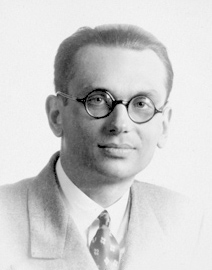 |
| Kurt Gödel |
Only if we assume a God who is morally our like can “truth” and the search for truth be at all something meaningful and promising of success. This God left aside, the question is permitted whether being deceived is not one of the conditions of life.Or why the renowned philosopher Immanuel Kant argued that "logic, morals, and science ultimately presuppose a Christian theistic worldview". Just to be clear, the point of these posts are not be to "prove" God exits but only to suggest that faith in something like God is actually necessary to make sense of reality religiously, logically, morally and even scientifically.
The point of this first post is to show that everyone must accept at least this minimal version of faith: that there are more things that are true about reality than are provable. This is not some nice philosophical hope but a mathematical fact shown by Gödel's two incompleteness theorems discussed below.
Thus if someone ever tells you that that they don't believe faith is necessary because eventually science, logic and reason can prove all things, you can know this claim has been shown to be false by Gödel. In fact, it is very interesting to me we find ourselves in a world where only worldviews that admit faith in truth beyond provability are possibly valid.
Gödel's first incompleteness theorem: there are more things that are true than provable.
First, let's formally state Gödel's first incompleteness theorem:
Any effectively generated theory capable of expressing elementary arithmetic cannot be both consistent and complete. In particular, for any consistent, effectively generated formal theory that proves certain basic arithmetic truths, there is an arithmetical statement that is true, but not provable in the theory (Kleene 1967, p. 250)Which means: if you have any consistent theory that is strong enough to account for elementary arithmetic, it cannot actually prove the truth of all things. (Be complete) In other words, no matter how smart, well-thought out and sophisticated your theory will ever be, if it is strong enough to account for elementary arithmetic and consistent, it will fail at demonstrating the truth of all things. In fact, there will literally be an uncountably infinite number of things about reality that are true, but that your theory will fail to demonstrate no matter how long or hard anyone tries.
One good lay resource on this subject is the Pulitzer Prize winning book Gödel, Escher, Bach in which Hofstadter writes:
In short, Gödel showed that provability is a weaker notion than truth, no matter what axiomatic system is involved.Gödel's second incompleteness theorem: one must have faith that logic itself isn't inconsistent.
Now we turn to Gödel's second incompleteness theorem that states formally:
For any formal effectively generated theory T including basic arithmetical truths and also certain truths about formal provability, if T includes a statement of its own consistency then T is inconsistent.This second theorem takes the necessity of faith one step further. Not only will a theory, sufficient to account for arithmetic, fail to be complete (not be able to prove all truths) but one can never even know that the theory itself is consistent! Because, as the statement concludes, any sufficiently complex theory that claims to be consistent must actually be inconsistent.
This means, as much as we love our mathematically based theories about reality, we can never know they are actually consistent. To accept them we must accept them based on faith. (Something we believe to be true but can never prove for certain.)
Some possible examples of things that may be true but not provable:
Saying there are things that are true but not provable is nice in the abstract sense, but it is helpful if some concrete examples can be given.
- Free will - There have been many philosophers, including the renowned Princeton mathematician John Conway in his video lectures here, that have shown that if free will is true, it cannot be known by proof. If you believe you have control over your thoughts and actions independent of determinism you must have faith in that. You can never prove it is actually true.
- Morality - If morality is true, you cannot know the truth of the matter from any scientific theory or proof. The respected philosopher David Hume pointed to this in his famous "is-ought" problem where he showed you can never derive "ought" (morality) from "is" (any scientific theory). Einstein further agrees and has observed one "cannot... speak of the scientific foundations of morality... every attempt to reduce ethics to scientific formulae must fail."
- Hawking's admission with science - Every once and a while someone tries to claim that Gödel's theorem only applies to the integers but this is not true. In fact even the great Stephen Hawking, a noted physicist and atheist, admitted in his talk Gödel and the End of the Universe that even science will forever be incomplete due to Gödel's theorems.
- Up to now, most people have implicitly assumed that there is an ultimate theory that we will eventually discover. Indeed, I myself have suggested we might find it quite soon... [However] a physical theory is self referencing, like in Gödel's theorem. One might therefore expect it to be either inconsistent or incomplete... Some people will be very disappointed if there is not an ultimate theory that can be formulated as a finite number of principles. I used to belong to that camp, but I have changed my mind.
- The halting problem in computer science - In addition to physics, Gödel's theorem creates an un-solvable problem in computer science known as the halting problem. There are some computer programs you can show will complete in a finite number of steps. Others you can show will run forever. (Like an infinite loop) The halting problem says there will always be an infinite number of programs that no matter how hard we try we can never prove if they run forever or halt in a finite time. (Hence a truth beyond proof.)
- Mathematical theorems like possible Goldbach's conjecture - In his talk linked above, Hawking uses the Goldbach's conjecture as a concrete example of a mathematical statement that may be beyond proof.
Goldbach's conjecture is simply this: "Every even integer greater than 2 can be expressed as the sum of two primes." That statement is actually either true of false and it or mathematical statements like it may be concrete examples of truths beyond provability. - The consistency of mathematics and logic itself - I already discussed this above following from Gödel's second theorem but it is worth mentioning again, especially because by the second theorem it must itself be one of the unprovable truths. If we want to adopt principles of logic and mathematics sufficiently strong enough to account for arithmetic, we are forced to confess the consistency of our logic and math will forever remain beyond our ability to prove!

